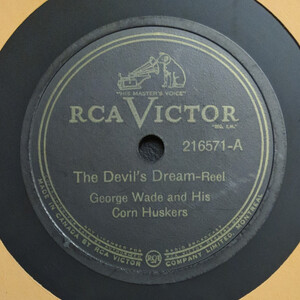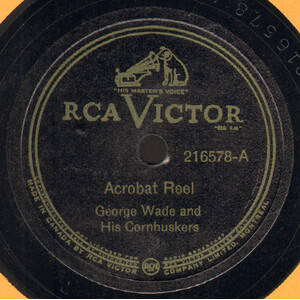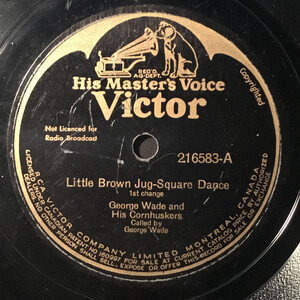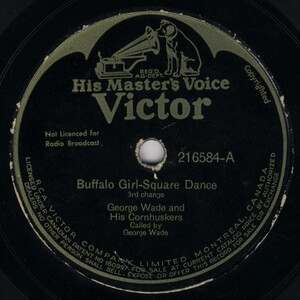Wade, George & His Cornhuskers
Websites:
No
Origin:
Toronto, Ontario
Biography:
George Wade and His Cornhuskers (or Corn Huskers). The most popular Canadian country band of its day. Though details of its history are sketchy, it is known that the band, led by the caller George Wade (b Manitoba ca 1895, d Toronto 23 Jan 1975), was based in Toronto and performed for dances in Ontario and Quebec from the mid-1920s probably until the 1940s. The band began broadcasting on CFRB, Toronto, in 1928 and in 1933 became the first group of its type to perform on the CRBC. It was heard regularly on the CRBC and, in turn, the CBC until the late 1930s, and toured in the Maritimes in 1933 and in western Canada ca 1935.
The band made around 78s for Victor's Black Label in 1933, each an arrangement of four or five dance tunes, with calls by Wade. Personnel ranged from 4 to 15; for records, a small group was used - two or three fiddles, banjo, piano, harmonica (or jew's harp), and a singer, 'Pete the Mountain'. Among sometime members of the band were the fiddlers Bill, Francis, and Laury Cormier, Jean Carignan, Bill Martin, Ted Steven, and Johnny Bentley; the pianist Johnny Burt (for CFRB broadcasts ca 1931-3 and the Victor 78s); the banjoist 'Doc' Boyd; the guitarist Tony Mont; and the bassist Cecil McEachern. A photograph ca 1930 in A Pictorial History of Radio in Canada (Toronto 1975) shows a cellist, a trumpeter, and a drummer among an eight-man group. Carignan recalled playing saxophone and clarinet with the Cornhuskers for dances.
The band appears to have broken up some time after it left regular employment with the CBC. Albums of pieces played by Wade (some composed by Bill Cormier and arranged by Burt) were published by Harry Jarman ca 1932 and, as part of a six-volume 'Cornhuskers Series of Canadian Square Dance Books,' ca 1947.
Wade and the Cornhuskers was a highly influential large band, one of the few recorded in Canada by RCA in the decade prior to the onset of World War II. However, very little information exists about the leader or his activities following the end of the recording ban that took place during the war, halting the careers of many a touring and recording artist. The most famous member of Wade's outfit was Quebec fiddler Jean Carignan, whom Wade hired off the streets of Montreal where he used to play during his lunch hour break from a job as a cobbler's apprentice. Carignan toured throughout Canada with the band from 1933-1938, during which time more than a dozen sides were recorded for RCA, all typical of the band's repertoire. These included quadrilles, reels, jigs, and medleys of Scottish and Irish tunes as well as pure country material. It was said that the band was similar in makeup to jazz big bands, yet played for the country crowd. One well-known Canadian artist who was influenced heavily by Wade's band was Don Messer, who fashioned his own concept and his group the Islanders after attending a gig by Wade and the Cornhuskers. Although no company has officially re-released the group's music, Canadian disc jockeys and enthusiasts have kept the name alive by frequent airplay on specialty shows as well as posthumous awards such as membership in various halls of fame for Canadian music.




